Advocacy
Women are the Key to the Future of Construction
Oregon Tradeswomen, in partnership with the U.S. Department of Labor Women’s Bureau and Portland Community College (PCC), celebrated Women in Construction Week at our “We Are the Key” event on March 4th! With the theme of this year’s Women in Construction Week being “Keys to the Future,” tradeswomen and advocates from across the industry gathered to talk about why Oregon women are the key to the future.
Hari Chon, Program Analyst for the U.S. Department of Labor Women’s Bureau, opened the event by sharing the origins of the Women’s Bureau back in 1920, two years before women got the right to vote. Established by the U.S. Department of Labor, the Women’s Bureau was formed to promote the welfare of women and advancing opportunities for women in the workforce. Through research and grants such as the Women in Apprenticeship and Non-Traditional Occupations (WANTO), the Women’s Bureau is actively working in alignment of Oregon Tradeswomen’s vision to improve and increase women’s participation in high-skill, high-wage union careers in the skilled trades. Oregon Tradeswomen is grateful for Hari and the Women’s Bureau for their support.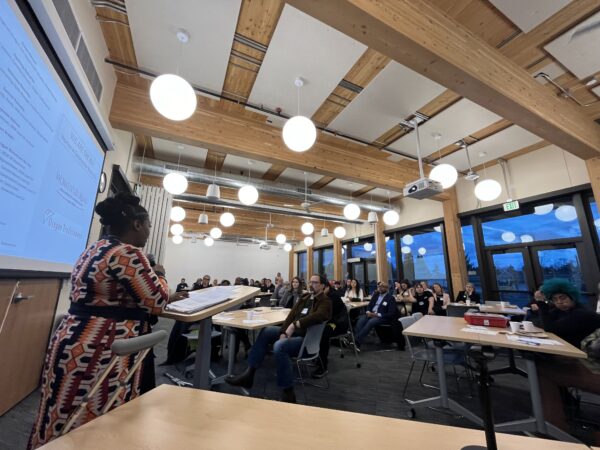
The event took place at Portland Community College’s new Opportunity Center, a space built in alignment with project labor agreements ensuring the work was done with diversity, equity, and inclusion in mind. Amy James Neel, Workforce & Contracting Equity Manager for Portland Community College, detailed that PCC incorporated voices from the community in the design and planning of this project, and worked with contractors, subcontractors, dispatchers, union halls, and apprentice coordinators to maximize opportunity and access for women and BIPOC workers to earn a living wage in these careers. In fact, 10,599 (51.5%) total hours were worked by apprentice women, 4,402 (41.5%) total hours were worked by BIPOC apprentice women. The total hours worked by women were 12,308 (16.8%), meeting and exceeding project goals. We were thrilled to learn that some of the tradeswomen who attended the event worked on the project and were excited to revisit the space that they helped build. To be in a space exemplifying the goals and intentions of Oregon Tradeswomen was inspiring, and we thank PCC for hosting us.
With a venue whose planning and construction not only talked the talk, but walked the walk, it was fitting that our event speakers echoed the need to tear down barriers enforced by systems set up to serve the interests of a select few rather than us all. Sebrina Owens-Wilson, the Director of Diversity, Equity, and Inclusion at Metro addressed how government agencies are coming together to find ways to help women and people of color access these high-wage, high-skill union jobs. One pathway towards progress is the implementation of Project Labor Agreements (PLA) and Community Benefit Agreements (CBA) such as the ones that were enforced on the PCC Opportunity Center project to much success. Our regional framework sets goals that ensure 20% of hours each week are worked by apprentices, 14% worked by women, and 25% worked by BIPOC. Sebrina spoke further on the importance of funding pre-apprenticeship programs to train up qualified and diverse workers, community organizations that reduce barriers to employment, and jobsite culture change programs such as RISE Up to increase the retention of a diverse workforce. This work is ongoing as shifting systems is a long game, but Sebrina left on the message that, “As women, we can do amazing things on our own… but we can move mountains if we work together.”
The theme of strength and working together towards a better future was emphasized when Isis Harris, Union Electrician with IBEW Local 48, Oregon Tradeswomen Board Member, and small-business owner, took the stage. Isis echoed Sebrina’s words when she spoke about coming together to collectively build a better future for women and the construction industry. By forging life-long friendships and mentorships between tradeswomen, we can foster an environment that highlights the potential of women and lifts each other up. While we can hold the door open for more women to enter the trades, Isis reminded us that we need to act now to retain the women who cross that threshold. The keys to retaining women in construction start with breaking down systemic barriers to employment such as access to childcare and maternity benefits. As we look to change the systems, we need accomplices to do this work. Together, we can lobby, advocate, and build systems that work for women and people of color. “We are not only the future, but we are the dismantlers of the past,” Isis shared. “Our walk is no longer about hopes and dreams, but the execution of strategized plans. Here and now, we are working lockstep towards a more sustainable future for women in construction. There is no completeness in the industry without us. There is no week on the calendar strong enough to contain our greatness. We are here not to forge a path, but to pave a freeway for women in the trades.”
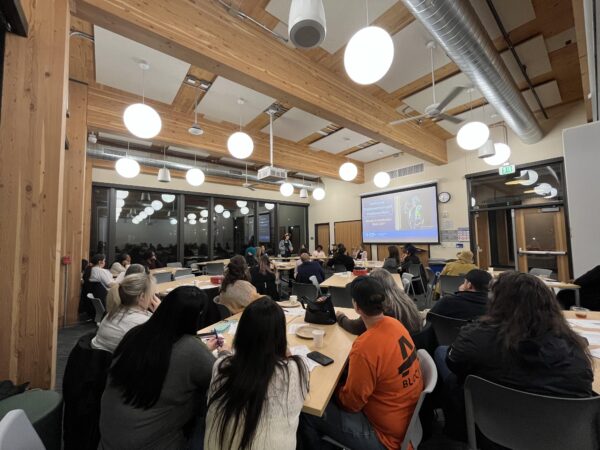 Following Isis’s powerful message, Susan Rodway, Treasurer at IBEW Local 48, moderated a panel discussion with Anjanet Banuelos Bolanos, Business Representative at LiUNA Local 737, Liz Nichols, Business Representative at Cement Masons Local 555, Montana Maurice, Project Engineer at Anderson Construction with Carpenters Local 271, Sharon Maxwell, Owner of Bratton Construction, and Willow Ryan, Co-Chair of Sisters of Iron with Ironworkers Local 29 as they shared about their paths into the trades, experiences with mentors and allies in the industry, and how to take your career to the next level. Three things became clear: Access to pre-apprenticeship training offered a pathway for all these women to find successful careers in construction; Mentors, allies, and a support system in general are crucial for successfully training and retaining women in construction; Women are held to a higher standard than their male counterparts and must go above and beyond to prove their themselves in the field. This panel illuminated the shared experiences of tradeswomen across trades, provided insight into where we are, and painted a picture of what the future could look like if we continue to collaborate on this important work.
Following Isis’s powerful message, Susan Rodway, Treasurer at IBEW Local 48, moderated a panel discussion with Anjanet Banuelos Bolanos, Business Representative at LiUNA Local 737, Liz Nichols, Business Representative at Cement Masons Local 555, Montana Maurice, Project Engineer at Anderson Construction with Carpenters Local 271, Sharon Maxwell, Owner of Bratton Construction, and Willow Ryan, Co-Chair of Sisters of Iron with Ironworkers Local 29 as they shared about their paths into the trades, experiences with mentors and allies in the industry, and how to take your career to the next level. Three things became clear: Access to pre-apprenticeship training offered a pathway for all these women to find successful careers in construction; Mentors, allies, and a support system in general are crucial for successfully training and retaining women in construction; Women are held to a higher standard than their male counterparts and must go above and beyond to prove their themselves in the field. This panel illuminated the shared experiences of tradeswomen across trades, provided insight into where we are, and painted a picture of what the future could look like if we continue to collaborate on this important work.
As Donna Hammond, Interim Executive Director of Oregon Tradeswomen, took the stage, she shared how struck she was by the collective passion and dedication that filled the room. Being a native Portlander born into a strong union family, and someone who became a pioneer for black women in construction in her 40+ years as a Union Electrician, Donna spoke about how humbled and inspired she was to share the stage with so many leaders in the tradeswomen movement. She reminded the crowd that “we convene here today not just as attendees, but as master builders and narrators of our own unique stories.” By sharing and amplifying these stories, Donna says “we lay a foundation for future growth and change in our industry.” Donna also announced a new and exciting partnership between Oregon Tradeswomen, IBEW Local 48, and the Department of Energy to create pathways for African American women and other women of color to enter the skilled trades with a focus on being certified as electrical vehicle changing station installers. We are excited to progress our mission to diversify the trades while providing access to high-wage careers that utilize cutting-edge technology in this new era of green energy infrastructure.
Donna closed out the event by circling back to the theme of the night, asking “Who holds the key?” to which the room exploded in a cheer of “We are the key!” The enthusiasm of the attendees was palpable, and sharing space in this beautiful new building was the perfect way to kick off Women in Construction Week. Thank you to the Women’s Bureau and Portland Community College for collaborating on this inspiring event and showing unwavering commitment to our cause. Together, we hold the key to building a more inclusive future for women in construction.
A Labor Day Reflection
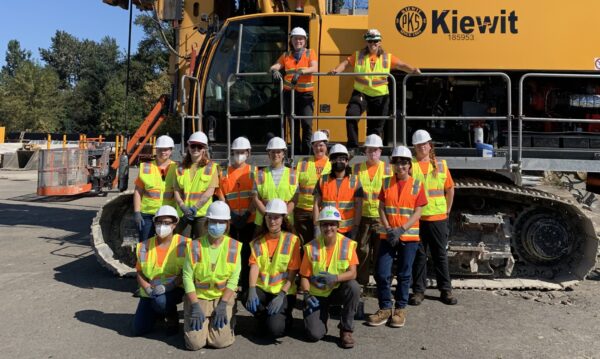
Here at Oregon Tradeswomen, we want to take a brief pause in our busy days to acknowledge workers and worker rights as we celebrate Labor Day. The first half of this year saw an increase in the number of workplaces unionizing, with workers across all sectors demanding to have safer workplaces, benefits, fair pay, and a voice in their work. Starbucks, Amazon, and Google workers all voted to unionize across the nation this past year. A huge win for the Labor Movement, and a huge win for workers.
These efforts are resonating with the broader public – according to a recent Gallup poll, 68% percent of Americans approve of labor unions — the highest rate since 71% in 1965. Perhaps it is an outcome of the COVID-19 pandemic, which prompted workers to rethink their work, their lives, and their relationship with employers. Health and safety was front and center for essential workers, and that included the construction industry and tradesworkers. Here in Oregon, the Building and Construction Trades Unions, AGC, and the Oregon Health Authority worked hard to keep them safe throughout these last few years of a frightening global health issue.
Here in Oregon, our community and industry partners are also working hard to keep tradesworkers safe through a regional effort to change jobsite culture – creating safe and respectful jobsites, free from harassment, hazing, and bullying – for all workers. The Safe from Hate Alliance includes many voices across our industry, including the voices of tradesworkers themselves.
Oregon Tradeswomen would like to thank our partners, and all who have fought and continue to fight for our nation’s workforce, to ensure worker safety, dignity, and justice. We are with you in the fight today, and always, as today we honor our nation’s workers!

Kelly Kupcak, Executive Director
Oregon Tradeswomen
Future Ready Oregon: A Win for Workforce Equity
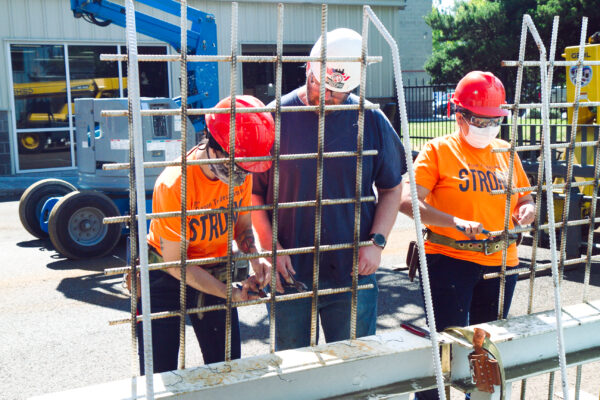
In a tremendous win for workforce training equity, Governor Kate Brown signed the Future Ready Oregon bill into law. Future Ready Oregon is a blueprint for change and an opportunity to build an economy in Oregon that supports all workers in achieving their dreams and building a more prosperous future.
Funding from this bill will create new workforce development programs and expand existing programs in healthcare, technology, manufacturing, and other high-demand sectors while reducing barriers to employment. This investment package will specifically support community college Career Pathways programs, local Workforce Boards, and apprenticeship programs as they expand their capacity to provide free career education and support services to more Oregonians. Funding will also strengthen pre-apprenticeship like Oregon Tradeswomen’s Pathways to Success program that demonstrates strong outcomes for women in construction. Oregon Tradeswomen program graduates start their careers making an average wage of $22.81 per hour.
In addition to supporting and expanding current workforce development programs, Future Ready Oregon encourages innovation by providing Workforce Ready Grants to fund education and training programs in industries lacking accessible career pathways. With these programs, there is a renewed commitment to continuous improvement and accountability by tracking data to measure success outcomes for underserved populations.
Oregon’s Racial Justice Council and the Governor’s Workforce Workgroup helped guide this policy through a lens focused on equity to ensure minority groups like women and people of color are not left out of economic recovery. Oregon Tradeswomen’s Executive Director, Kelly Kupcak, served on the Governor’s Workforce Workgroup and contributed to the proposal which includes the goal of serving at least 50% women through these new and existing programs.
Future Ready Oregon makes much-needed new investments in the programs that help workers overcome barriers to pursuing careers providing economic security through good wages, health insurance, and retirement benefits. These investments will provide resources to offset the costs of support services such as childcare, transportation, and housing stabilization. When quality training is coupled with direct support, workers are successful in securing employment, businesses can meet their labor demands with a qualified workforce, and our communities have a shared prosperity model that works for everyone.
Tradeswomen Advocate Leslie Cotton Pushes for Equity
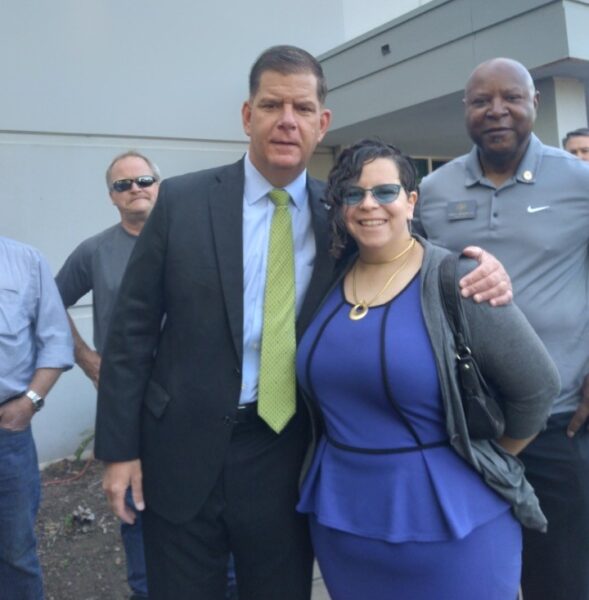
The first step to affecting change is by raising awareness: nothing can change if people don’t know about the issues! The tradeswomen movement has been around for decades, but with historically low numbers of women in the trades, it has been an uphill battle to gain visibility of this mission with our leaders, but times are changing.
The tradeswomen movement is more than just changing the idea that women can work in construction. It’s about ensuring jobsites are welcoming to women, creating debt-free pathways to employment, and reducing barriers to accessing these careers such as affordable childcare or reliable transportation. While Oregon Tradeswomen has been helping women find success in the trades since 1989, we need the awareness and support of our leaders to set up better systems to continue training and retaining diverse, skilled workers in the face of a huge labor shortage.
The Biden Administration passed the new Bipartisan Infrastructure Bill giving long-overdue funding to repair, rebuild, and improve upon the United States’ aging infrastructure. In addition to the roads and bridges associated with infrastructure, these funds will invest in the workers needed to achieve these goals. This means expanding apprenticeship and pre-apprenticeship training, addressing workplace harassment and discrimination, and ensuring women and people of color are included in this monumental overhaul of our nation’s infrastructure.
From the inception of the bill, our leaders have shown their commitment to listening to the voices of tradesworkers to make this plan equitable and effective. As part of a Memorandum of Understanding (MOU) between the U.S. Department of Labor and the U.S. Department of Transportation, a virtual Town Hall was held on March 7th, 2022 to hear from a panel of workers around equitable job creation, job quality, labor standards, and workforce development. One of these panelists was Leslie Cotton, an Oregon Tradeswomen graduate and Union plumber with UA Local 290. Leslie has been a vocal advocate for women and people of color in the trades and had the opportunity to speak directly with Labor Secretary Marty Walsh on the importance of access to job-training for rural Americans, and safe, healthy workplaces.
Leslie shared her story as the daughter of a single father in rural Washington who struggled, like many others in their small community, to find work that could support his family. Seeing her father work day-and-night to provide for Leslie and her disabled brother drives Leslie’s activism because she knows her family is not alone in this experience. When her father got sick, Leslie was faced with the responsibility to provide for her family and, with the job-training she received at Oregon Tradeswomen, she found the ability to do so in the trades.
Even though Leslie worked hard to build her career, as a woman and a person of color, she faced her share of obstacles. Men on the job would belittle her because they just saw her as a “diversity hire,” and not a fellow trades-worker. She even came to work one day to find a noose on her jobsite, a racist symbol that is now illegal to display in the State of Oregon. These experiences are not uncommon and by speaking up, Leslie is letting our leaders know that more must be done to ensure workplaces free of harassment, hazing, and discrimination.
With the input of trades-workers like Leslie, our movement has more visibility than ever. As a result, we are seeing a new commitment from policy-makers to invest in systems centered in equity. We look forward to following the implementation of the Infrastructure Bill and the impact on our industry. Everyone deserves to work meaningful, family-supporting jobs and we believe we are at the precipice of real change for workers everywhere.
Build Back Better: A visit from U.S. Labor Secretary Marty Walsh
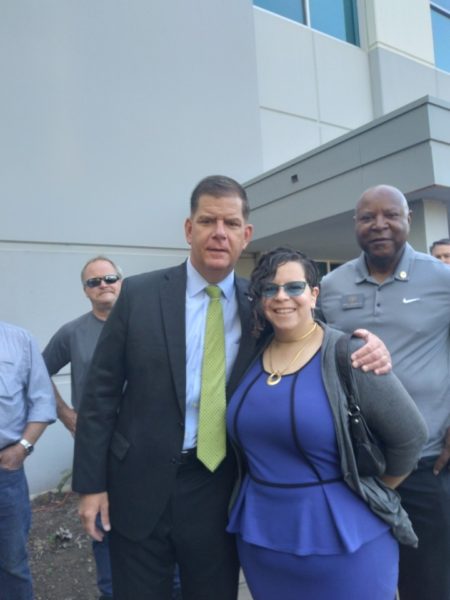
U.S. Labor Secretary Marty Walsh with Oregon Tradeswomen graduate Leslie Cotton
On Tuesday, August 10, 2021, U.S. Labor Secretary Marty Walsh visited Oregon and came to the UA Local 290 Springfield Training Center to talk about the Biden administration’s #BuildBackBetter plan and the goal of building an inclusive, worker-centered economy.
Secretary Walsh was joined by Representative Peter DeFazio, Oregon Labor Commissioner, Val Hoyle, and other labor leaders around the state. Together, they discussed the pending infrastructure bill and how the Biden administration plans to invest in apprenticeship and advancements for workforce equity.
The same day, the U.S. Senate passed a bipartisan physical infrastructure bill including substantive investments in roads, bridges, rail, transit, and utilities. The amendment for workforce equity which would increase access for women and people of color on infrastructure construction jobs was not included in the final bill.
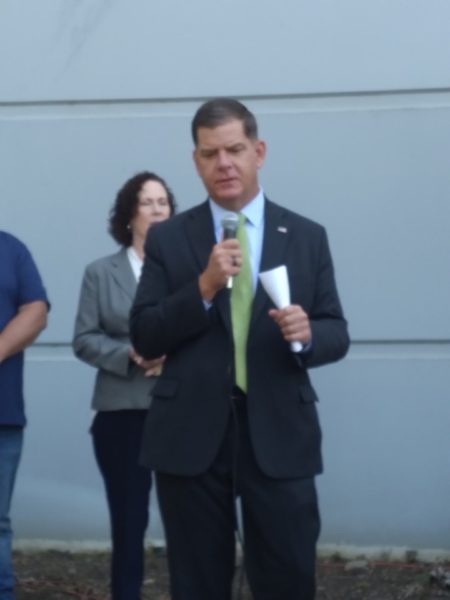
Oregon Labor Commissioner Val Hoyle listens to U.S. Department of Labor Secretary Marty Walsh
Our tradeswomen community will continue to work for equitable access and opportunities for women and people of color in the construction industry and is so appreciative of the Labor Secretary’s visit to advocate for registered apprenticeship, pre-apprenticeship, and infrastructure investments to benefit all workers. When asked by Oregon Tradeswomen’s Executive Director, Kelly Kupcak, about his leadership at the U.S. Department of Labor, he outlined a comprehensive commitment to all workers, migrants, women, disabled persons, veterans, and BIPOC. He concluded by saying “Equity is in my DNA”.
Oregon Tradeswomen is grateful for Secretary Walsh’s leadership and his dedication to equity and fighting for worker dignity on the front lines.
The Hardhats with Heart Initiative
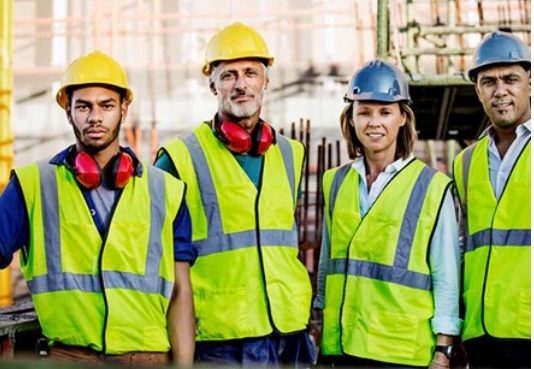
Did you know construction workers are disproportionately affected by heart disease? One in four tradesworkers have high blood pressure, some even being unaware of it before its too late! While construction careers are active jobs, some even say a replacement for the gym, that doesn’t automatically grant tradesworkers a path to great health. After speaking with Lily Banning of the American Heart Association (AHA), we learned there are multiple factors for this heightened risk for heart-attack and stroke for tradesworkers.
Hardhats with Heart is an initiative under the AHA that came to existence when a volunteer, Bart Dickson, President and Founder of Cobalt, spoke up about the frankly unacceptable amount of times he had to make calls to the families of his workers to let them know their loved ones had suffered from a heart attack or stroke on the jobsite. After some investigation, it became clear that there is a direct connection between stress and heart health for tradesworkers with the mental and physical demands of the jobs often being exacerbated by unhealthy coping habits such as poor diet, increased use of energy drinks, use of tobacco products, as well as lack of information about the warning signs of cardiovascular disease.
The AHA is also exploring the role of workplace culture as a contributing factor to overall stress levels and heart health. Jobsites where workers experience harassment and discrimination are hostile work environments which not only negatively impact worker safety, productivity, and retention, but also heart health and overall well-being! These impacts are intensified for women and BIPOC tradesworkers, which is why Oregon Tradeswomen focused on jobsite culture change work: we are an affiliate trainer of RISE Up – a bystander intervention model to prevent bullying and harassment, and part of the work around Safe From Hate which calls on all industry stakeholders in the construction industry to advance diversity, equity, and inclusion by clearly addressing jobsite culture.
With help from construction companies and construction-adjacent organizations like Oregon Tradeswomen, the American Heart Association started Hardhats with Heart in 2017 with three local priorities here in Oregon: Increase access and education about healthy diets, help tradesworkers manage chronic disease, and reduce the high risk of heart disease in tradeswomen. Hardhats with Heart is working hard with the local construction industry to provide jobsite trainings on health and stress-management, offering on-site blood pressure screenings, and creating a virtual Resource Hub for tradesworkers and their employers to learn more about the simple ways they can help prevent heart disease and deaths.
This online Resource Hub is dedicated to health information specific to the construction industry with the intent of being free and easily available. Subjects include nutrition, mental well-being, fitness, managing blood pressure, and more! When we asked the AHA’s Community Impact Director, Lily Banning, about what she wanted our audience to know about these online resources, she told us, “Hardhats with Heart is rolling out a series of industry-wide trainings for free! There is a focus on a different topic for every month starting this July, running through December. We encourage all tradesworkers and their employers to join in on the conversation and get their questions answered!”
Hardhats with Heart looks to continue improving its resources and the services they offer to tradesworkers so that the number of lives lost from preventable disease is reduced. To do this, they want to hear from you! What are you doing to take care of your health? Is there a focus on health, both heart specific and holistically, on your jobsite? What can Hardhats with Heart do for you?
If you are passionate about this issue and want to contribute or want to learn more about how to get involved with Hardhats with Heart, please contact Lily Banning at Lily.Banning@heart.org.
As a community, the goal is to provide free and easy to access free resources to help inspire and equip tradesworkers to live longer, healthier lives.
2021 DJC Building Diversity Awards

- GeoEngineers
- Todd Duwe, Perlo Construction
- Meyer Memorial Trust headquarters project
- Mel Jones, JE Dunn Construction
- Román Hernández, Troutman Pepper
- Kelly Kupcak, Oregon Tradeswomen Inc.
- Wenaha Group
- Portland Building reconstruction project
- RKm Development
- The Skanner (lifetime achievement award)
- Center for Equity & Inclusion
- Advanced Tribal LLC
- Hacienda Community Development Corp.
- Angela Watkins, Minority Construction Group and Constructing Hope
- NAMC University
- Safe from Hate initiative
International Worker’s Day 2021

On May 1st, we recognize International Workers Day, also known as May Day, to honor workers and the fight for worker’s rights throughout history. May 1st was chosen to commemorate the 1886 Haymarket Square Massacre in Chicago where, what began as a peaceful rally in support of workers striking for an eight-hour workday, ended in several dead, dozens of wounded, and an aftermath of social unrest.
This fight continues. The month of May marks the anniversary of a heinous crime of hate on a jobsite in downtown Portland where Oregon Tradeswomen graduate and UA Local 290 member Leslie Cotton found a noose on job-site where she was working as an apprentice plumber. Our industry and our community were outraged, and rightfully so, that this blatant act of hate was put on display for all to see, and to serve as a threat to some of the workers on that jobsite.
Since that awful day, our industry and our community have come together to work to put an end to jobsite harassment, collectively working to make construction jobsites safe from hate.
This week, the House Judiciary Committee of the Oregon Legislature is taking up SB 398, which passed the Senate in March. If it passes in the House, the bill would make it a crime to display a noose. There is much more work to do.
While the construction industry provides excellent careers pathways, family-supporting wages, and benefits such as healthcare and pensions, it also has a long history of harassment, hazing, bullying, and discrimination. This unacceptable behavior is most often directed at women and people of color, and for too long, this hostile culture has been permitted to continue.
Oregon Tradeswomen, along with many other industry stakeholders, have long spoken out against discrimination and hate on jobsites and remain committed to changing toxic jobsite culture. Through our participation in the Safe from Hate Alliance, the Metropolitan Alliance for Workforce Equity (MAWE), and in implementing a jobsite culture program called RISE Up (Respect, Inclusion, Safety and Equity), Oregon Tradeswomen is pushing for long-overdue, needed changes to make workplaces safe for all workers.
Our guiding voice for jobsite culture change is the Tradesworker Equity Council (TEC). The TEC is comprised of a diverse group of committed tradesworkers who are part of the Safe from Hate Alliance Steering Committee. Leslie Cotton, the tradesworker who found the noose on their jobsite last May, is a member of this council. She, along with the other Council members and the many tradesworkers in our industry, are the unsung champions in this work. They show up every day not only to do the heavy and hard work of construction, but the equally difficult work of fighting for worker justice and equity.
Oregon Tradeswomen is immensely grateful to the members of the TEC who are the true heroes of this work. Their candor, courage, and tenacity is helping make our industry safe and respectful for all workers.
Thank you for showing up, speaking out and standing up. We are now, and always, humbled, inspired and honored to work alongside you in fighting for justice and equity.
Mary Ann Adkins-Bahena, IUOE Local 701
Janett Arellano, UA Local 290
Leslie Cotton, UA Local 290
Jessica Hendrickson, Heat & Frost Insulators Local 36
Nickeia Hunter, PNW Carpenters Local 1503
Warren T Hunter Jr., UA Local 290
Miranda Jenniches, IUOE Local 701
Jelani McRae, IBEW Local 48
Alejandra Prado, PNW Carpenters Local 1503